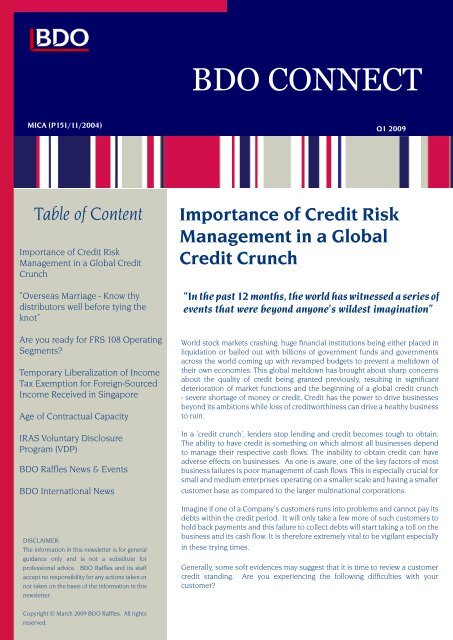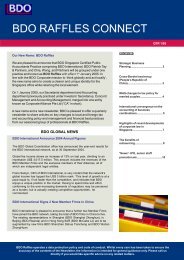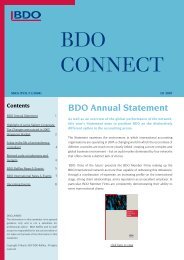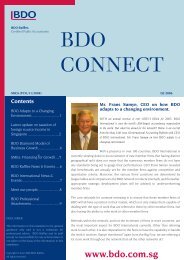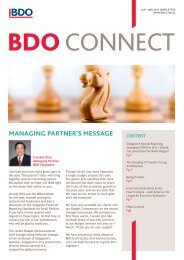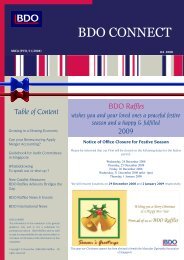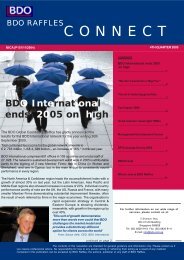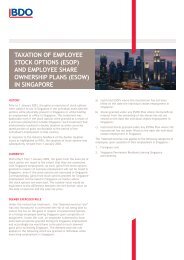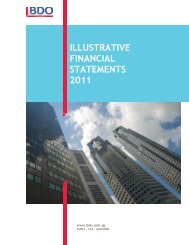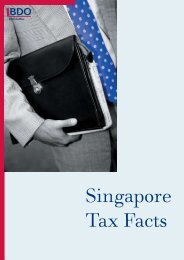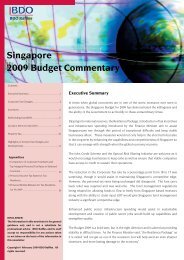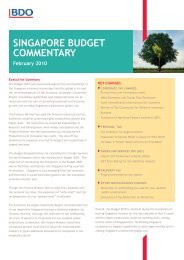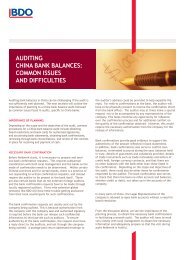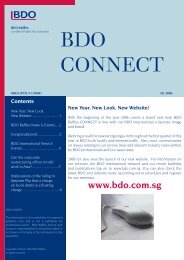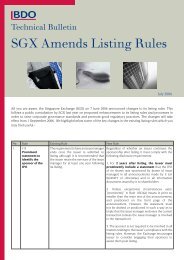Q1 March Newsletter - bdo singapore
Q1 March Newsletter - bdo singapore
Q1 March Newsletter - bdo singapore
You also want an ePaper? Increase the reach of your titles
YUMPU automatically turns print PDFs into web optimized ePapers that Google loves.
MICA (P151/11/2004)<br />
MICA (P151/11/2004)<br />
Table of Content<br />
Importance of Credit Risk<br />
Management in a Global Credit<br />
Crunch<br />
“Overseas Marriage - Know thy<br />
distributors well before tying the<br />
knot”<br />
Are you ready for FRS 108 Operating<br />
Segments?<br />
Temporary Liberalization of Income<br />
Tax Exemption for Foreign-Sourced<br />
Income Received in Singapore<br />
Age of Contractual Capacity<br />
IRAS Voluntary Disclosure<br />
Program (VDP)<br />
BDO Raffles News & Events<br />
BDO International News<br />
DISCLAIMER:<br />
The information in this newsletter is for general<br />
guidance only and is not a substitute for<br />
professional advice. BDO Raffles and its staff<br />
accept no responsibility for any actions taken or<br />
not taken on the basis of the information in this<br />
newsletter.<br />
Copyright © <strong>March</strong> 2009 BDO Raffles. All rights<br />
reserved.<br />
BDO CONNECT<br />
<strong>Q1</strong> 2009<br />
Importance of Credit Risk<br />
Management in a Global<br />
Credit Crunch<br />
“In the past 12 months, the world has witnessed a series of<br />
events that were beyond anyone’s wildest imagination”<br />
World stock markets crashing, huge financial institutions being either placed in<br />
liquidation or bailed out with billions of government funds and governments<br />
across the world coming up with revamped budgets to prevent a meltdown of<br />
their own economies. This global meltdown has brought about sharp concerns<br />
about the quality of credit being granted previously, resulting in significant<br />
deterioration of market functions and the beginning of a global credit crunch<br />
- severe shortage of money or credit. Credit has the power to drive businesses<br />
beyond its ambitions while loss of creditworthiness can drive a healthy business<br />
to ruin.<br />
In a ‘credit crunch’, lenders stop lending and credit becomes tough to obtain.<br />
The ability to have credit is something on which almost all businesses depend<br />
to manage their respective cash flows. The inability to obtain credit can have<br />
adverse effects on businesses. As one is aware, one of the key factors of most<br />
business failures is poor management of cash flows. This is especially crucial for<br />
small and medium enterprises operating on a smaller scale and having a smaller<br />
customer base as compared to the larger multinational corporations.<br />
Imagine if one of a Company’s customers runs into problems and cannot pay its<br />
debts within the credit period. It will only take a few more of such customers to<br />
hold back payments and this failure to collect debts will start taking a toll on the<br />
business and its cash flow. It is therefore extremely vital to be vigilant especially<br />
in these trying times.<br />
Generally, some soft evidences may suggest that it is time to review a customer<br />
credit standing. Are you experiencing the following difficulties with your<br />
customer?
Continued......<br />
Importance of Credit Risk Management in a Global<br />
Credit Crunch<br />
Cheque Payments<br />
Is it an accident or a deliberate attempt by a debtor to<br />
buy time? It should worry you if you start experiencing<br />
the following situations more frequently:<br />
• Missing signature(s) on cheque<br />
• The words and figures on the cheque differs<br />
• The cheque is post-dated<br />
• Cheque that has been purportedly mailed out but<br />
never received by you (lost in transit or was it never<br />
mailed?)<br />
Queries and Excuses<br />
• Repeated requests for copy of invoices / statements<br />
of accounts<br />
• Numerous queries on account<br />
• Phone calls are constantly channelled to voice<br />
mails<br />
• Resistance by customers to return calls<br />
Information from Staff<br />
Sales teams are the business’ eyes and ears in the<br />
marketplace. It pays to keep our ears on the ground<br />
and likewise, it is worthwhile to be in constant<br />
communication with fellow industry players. Sales<br />
staff should indulge in trade talks with their customers.<br />
During visits to customer’s premises, one can observe<br />
if there are high level of unsold stock or smaller<br />
and infrequent orders. There are just some simple<br />
observations to gauge how the customer’s business<br />
is doing.<br />
Besides soft evidences, the Company can make use<br />
of hard evidences, which will require you to have<br />
access to all available financial data of the debtor.<br />
Information such as, income statements, balance<br />
sheets and cash flow statements and interpreting<br />
these financial data will facilitate your assessment of<br />
the debtors. Analytical models / tools such as Altman<br />
Z-score (Z-Score Insolvency Prediction Calculator),<br />
Liquidity Ratios, Efficiency Ratios, Profitability Ratios<br />
and reports from credit agencies also can be used<br />
to assist the Company in reviewing your customers’<br />
credit worthiness.<br />
It is crucial for business to constantly examine the<br />
debtors’ operations, much more so that the world is<br />
in a recession, and it is of extreme importance not to<br />
rely too heavily on one customer and review other<br />
customers’ viability and creditworthiness.<br />
And as the old saying goes,<br />
“Turnover is vanity, profit is sanity<br />
and cash-flow is reality”<br />
Article contributed by:<br />
Dev Nandwani<br />
Senior Associate<br />
Business Restructuring<br />
Services<br />
Tel: 68289118<br />
devnandwani@<strong>bdo</strong>.com.sg
Finding Overseas Partners - Know Thy Distributors Well<br />
Before “Tying the Knot”<br />
Exporting overseas remains a challenge for SMEs<br />
wishing to venture into international markets. In<br />
the latest 2008 DP Information Group SME survey,<br />
companies stated that the top success factor was<br />
being able to find “the right partner overseas”. Hence,<br />
it becomes imperative for our local businesses to<br />
possess the relevant knowledge on how it can go<br />
about finding and securing the right distributors in a<br />
systematic manner.<br />
In this article, we examine some of the key issues on<br />
how ideal distributors can be secured in terms of their<br />
identification, evaluation and selection. In essence,<br />
the entire process can be organised in five key steps<br />
and they are:<br />
• Know What You Want First<br />
• Understand Your Markets<br />
• Evaluate Your Potential Distributors<br />
• Do Your Due Diligence<br />
• Secure The Deal<br />
Step One – Know What You Want First<br />
Before a company embarks on finding its ideal<br />
distributors, it has to know what it really wants.<br />
This entails a thorough understanding of its own<br />
market position, product and service portfolio,<br />
target customers, key competitors and the strategic<br />
outcomes it hopes to achieve via distributorship in<br />
each market. These inputs should translate into a<br />
desired criteria list that encompasses the financial<br />
and human resources, image and reputation, market<br />
access and network and preferred credit terms of the<br />
distributors in each country.<br />
Step Two - Understand Your Markets<br />
Simultaneously, one should also assess the current<br />
political, economic, social and technological<br />
environment in each target market. In addition, a<br />
holistic understanding of the relevant industry’s<br />
market size, consumer spending, competitive<br />
landscape, distributor channels and future trends<br />
should be achieved.<br />
Having determined the viability of distributorship in<br />
these markets, a list of potential distributors could be<br />
developed via one or more of the following ways :<br />
• Company and relevant trade association websites<br />
• Local and foreign investment trade agencies<br />
• Insights from other local industry players and<br />
business associates who have ventured into the<br />
same markets<br />
• Seek professional advisory services<br />
Step Three - Evaluate Potential Distributors<br />
This step represents the climax of the entire partner selection<br />
process itself. How should one benchmark an interested<br />
distributor? We advocate that it would be beneficial to adopt<br />
a methodical approach which duly evaluates a distributor<br />
using a combination of both hard and soft factors as<br />
suggested below:<br />
Focus Criteria<br />
Management Profile<br />
(Who is Your Distributor?)<br />
Firm Resources<br />
(What does Your Distributor have?<br />
Market Access<br />
(Where can Your Distributor Bring<br />
You?)<br />
Commitment<br />
(Which way does Your Distributor<br />
do Business?)<br />
• Experience in same and/or<br />
similar businesses<br />
• Responsiveness in sending<br />
necessary information<br />
• Image and reputation<br />
• Similarity of vision and business<br />
goals<br />
• Market knowledge<br />
• Turnover<br />
• Employment<br />
• Strength of Business network<br />
• Similar products carried by<br />
distributor<br />
• Countries with distribution<br />
operations<br />
• Cities with distribution operations<br />
• Retailers distribution<br />
• Annual order size of goods<br />
• Credit terms<br />
Undertaking a benchmarking exercise compels a company<br />
to approach and customise their distributor analysis<br />
according to their strategic needs. It allows for the<br />
evaluation and ranking of potential candidates in order of<br />
preference which saves time and resources when deciding<br />
who to approach first when securing the all important<br />
“breakthrough first deal”.<br />
Step Four - Do Your Due Diligence<br />
Due diligence of the distributors should be conducted to<br />
validate the information provided by them. It reassures<br />
the company that it will be dealing with both reliable and<br />
reputable parties. Required information that could be<br />
obtained on a best endeavour basis includes:<br />
• Audited company financial statements<br />
• Key customers references<br />
• Independent credit bureau and agency ratings
Continued......<br />
Step Five – Secure The Deal<br />
Lastly, it is very important to address the specific<br />
negotiation issues at hand for each distributor based<br />
on the initial terms and conditions offered during the<br />
correspondence process. This is often dependent on the<br />
bargaining power of the respective parties. An important,<br />
though often overlooked tip is to fully appreciate the<br />
cultural and social aspect, and the mode of operations<br />
of these distributors while being able to provide them<br />
their needs when brokering a deal. This in turn enhances<br />
your company’s chances of obtaining the best possible<br />
outcome during the negotiation process itself.<br />
To sum up, actively engaging the five major steps above<br />
allows a business to expedite the process of securing an<br />
ideal overseas distributor in a systematic manner and<br />
achieve its long-term overseas expansion plan.<br />
How BDO Raffles can help<br />
The Management Consulting division of BDO Raffles<br />
helps clients by identifying and securing suitable<br />
business opportunities and partners to successfully gain<br />
market entry in overseas markets. Currently, it is helping a<br />
number of companies ranging from the retail, leisure and<br />
lifestyle and F&B industries to secure overseas partners<br />
in both Asia and Europe.<br />
Should you like to find out more about how we can help<br />
you in your internationalistion efforts, please do not<br />
hesitate to contact our Management Consulting Division<br />
at weehan@<strong>bdo</strong>.com.sg<br />
Article contributed by:<br />
Leo Kah Mun<br />
Manager<br />
Management Consulting<br />
Services<br />
DID: 68289603<br />
kahmun@<strong>bdo</strong>.com.sg<br />
Are you ready for<br />
FRS 108 Operating<br />
Segments?<br />
A number of new or revised financial reporting standards<br />
have been issued in recent years which will take effect<br />
for annual periods beginning on or after 1 January 2009<br />
and they may or may not have implications on your<br />
company’s accounts. One of them relates to FRS 108<br />
Operating Segments which will supersede FRS 14 Segment<br />
Reporting.<br />
FRS 108 aims to present more relevant information to users<br />
by mirroring information used internally by chief operating<br />
decision makers to manage segments to those disclosed in<br />
the financial statements. Consequently, FRS 108 provides<br />
more flexibility in disclosure requirements.<br />
Consistent with FRS 14, FRS 108 is applicable to entities<br />
whose equity or debt securities are publicly traded<br />
and those that file, or are in the process of filing, their<br />
financial statements with a securities commission or<br />
other regulatory organisation for the purpose of issuing<br />
any class of instruments in a public market. Similarly, only<br />
consolidated segment information is presented when both<br />
the separate and consolidated financial statements of the<br />
parent company are presented in a single financial report.<br />
Contrary to FRS 14 which requires the identification of<br />
primary and secondary segments based on the definitions<br />
given, FRS 108 adopts the “management approach” by<br />
requiring the entity to disclose segment information based<br />
on components of the business that management uses to<br />
make decisions about operating segments.<br />
In addition to the differing approach undertaken, FRS 108<br />
also differs from FRS 14 in other requirements including<br />
the following:
Continued......<br />
Are you ready for FRS 108 Operating Segments?<br />
FRS 108 FRS 14<br />
Identification of segment Considers that a component of<br />
an entity that sells primarily or<br />
exclusively to other operating<br />
segments of the entity meets the<br />
definition of an operating segment<br />
if the entity is managed in that<br />
manner.<br />
Measurement of segment<br />
information<br />
Disclosures Specified Items<br />
Gives more discretion in defining<br />
segment information, limited only<br />
by an entity’s internal reporting<br />
practice. The entity is required to<br />
provide an explanation of bases<br />
used and perform reconciliation<br />
between the segment information<br />
on an aggregate basis (of all<br />
reportable segments) to the<br />
amounts reported in the financial<br />
statements.<br />
Requires the disclosure of specified<br />
amounts about each reportable<br />
segment, if the specified amounts<br />
are included in the measurement<br />
of segment profit or loss or are<br />
otherwise regularly provided to<br />
the chief operating decision maker<br />
(“CODM”), even if not included in<br />
that measure of profit or loss.<br />
Interest Income and Expense<br />
Requires the disclosure of interest<br />
income separately from interest<br />
expense for each reportable<br />
segment unless a majority of the<br />
segment’s revenue are from interest<br />
and the CODM relies primarily on<br />
net interest revenue to assess the<br />
performance of the segment and to<br />
make decisions about resources to<br />
be allocated to the segment.<br />
General information<br />
Requires the disclosure of the<br />
entity’s products and services,<br />
geographical areas and major<br />
customers, regardless of the entity’s<br />
organisation, if the information<br />
is not included as part of the<br />
disclosures about segments. Such<br />
entity-wide disclosures are required<br />
even when the entity has only one<br />
reportable segment.<br />
Limits reportable segments to<br />
those that earn a majority (>50%) of<br />
their revenue from sales to external<br />
parties and does not require the<br />
different stages of a verticallyintegrated<br />
entity to be identified as<br />
separate segments.<br />
Requires segment information to<br />
be prepared using the accounting<br />
principles adopted for the financial<br />
statements of the entity.<br />
Segment information is therefore an<br />
analysis of the entity’s information<br />
disclosed in the financial statements.
Continued......<br />
While FRS 108 is only effective for annual reporting<br />
periods beginning on or after 1 January 2009, you<br />
should now take steps to consider the impact of FRS<br />
108 on your company’s financial statements if your<br />
company falls within the scope of FRS 108.<br />
The adoption of FRS 108 may also affect your company<br />
in the identification of cash generating units for goodwill<br />
impairment under FRS 36 Impairment of Assets. In<br />
addition, when ED FRS 105 Non-Current Assets Held<br />
for Sale and Discontinued Operations is approved and<br />
issued, the adoption of FRS 108 may also affect the<br />
identification of discontinued operation.<br />
FRS 108:36 states that segment information reported<br />
as comparative information in the first year of its<br />
application shall be restated to conform with the<br />
requirements of FRS 108, unless the necessary<br />
information is not available and the cost of developing<br />
it proves to be excessive. However, given that most of<br />
the information is based on the information reported to<br />
the CODM, and in view that a lengthy implementation<br />
period has been allowed given that FRS 108 has been<br />
issued in 2007, justifying that this information is not<br />
available may be difficult.<br />
In view of the above, if you are not already in the<br />
process of doing it, it is time to start reviewing your<br />
current management reporting system and consider<br />
whether improvements are needed before collating<br />
comparative information.<br />
As a tip, the key to identifying an operating segment<br />
under FRS 108 is to first determine your company’s<br />
CODM. One of the criteria that a component of an<br />
entity must meet to qualify as an operating segment<br />
is that the information of that component must be<br />
regularly reviewed by the CODM to make decisions<br />
about the allocation of resources to the component<br />
and to assess its performance.<br />
FRS 108:7 states that CODM describes a function rather<br />
a person with a specific title. The function is to allocate<br />
resources to and assess the performance of the operating<br />
segments of an entity. While the CODM of an entity can<br />
often be its Chief Executive Officer or the Chief Operating<br />
Officer, the CODM may also be a group of persons<br />
comprising the entity’s executive directors or others.<br />
Nevertheless, it is a relief to note that depending on the<br />
manner FRS 14 was applied previously, the adoption of<br />
FRS 108 may or may not change your Company’s current<br />
basis of segment reporting.<br />
Article contributed by:<br />
Narissa Chen<br />
Manager<br />
Audit Technical and<br />
Training<br />
DID: 68289178<br />
narissachen@<strong>bdo</strong>.com.sg
Temporary Liberalization of Income Tax<br />
Exemption for Foreign-Sourced Income Received in<br />
Singapore<br />
Following the budget announcement on 22 January 2009<br />
with regard to the temporary lifting of the conditions<br />
for remittance of foreign-sourced income, the IRAS had<br />
subsequently released an e-guide on 20 February 2009<br />
which specified in details on the nature of the foreignsourced<br />
income and the conditions for the exemption.<br />
Foreign-Sourced Income Exemption (FSIE)<br />
Currently, under the Foreign-Sourced Income Exemption<br />
(FSIE), foreign-sourced dividends, foreign branch profits<br />
and foreign-sourced service income received in Singapore<br />
by any resident non-individual or any individual resident in<br />
Singapore through a partnership in Singapore are exempt<br />
from tax provided the following conditions are met:<br />
a. In the year the income is received in Singapore, the<br />
headline tax rate (i.e. the highest corporate tax rate of the<br />
foreign jurisdiction; it need not be the actual rate of tax<br />
imposed on the foreign income) of the foreign jurisdiction<br />
from which the income is received is at least 15%;<br />
b. The specified foreign income must have been subject<br />
to tax (i.e. tax must have been paid or is to be paid and<br />
does not include deferred tax) in the foreign jurisdiction<br />
from which they were received. The IRAS has clarified<br />
that foreign-sourced income would be considered to<br />
have met the “subject to tax” requirement if the income is<br />
exempted from tax in the foreign jurisdiction as a direct<br />
consequence of that foreign jurisdiction granting a tax<br />
incentive for carrying out substantive business activities<br />
in that jurisdiction; and<br />
c. The IRAS is satisfied that the tax exemption would be<br />
beneficial to the person resident in Singapore.<br />
Deemed remittance<br />
Currently, under Section 10(25) of the Singapore Income<br />
Tax Act (SITC), foreign-sourced income is considered to<br />
have been received in Singapore if :<br />
a) the income is remitted to, transmitted or brought into,<br />
Singapore; or<br />
b) the income is applied in or towards satisfaction of any<br />
debt incurred in respect of a trade or business carried on<br />
in Singapore; or<br />
c) the income is applied to purchase any movable property<br />
which is brought into Singapore.<br />
New tax treatment<br />
To help businesses to tap on their foreign funds during this<br />
current period of tight credit, the conditions (a) to (c) as stated<br />
above under the FSIE are temporarily lifted. Additonally,<br />
the FSIE scope is also temporarily expanded to cover all<br />
foreign-sourced income (including interest, rental, royalty<br />
etc). However, exemption applies to foreign-sourced income<br />
that is earned on or before 21 January 2009 and received or<br />
deemed to be received in Singapore during the period from<br />
22 Jan 2009 to 21 January 2010.<br />
In determining whether the foreign-sourced income has<br />
accrued to a taxpayer in Singapore on or before 21 January<br />
2009, the Comptroller of Income Tax (CIT) will take guidance<br />
from considerations set out in the Financial Reporting<br />
Standard (FRS) 18 on revenue recognition for financial<br />
reporting purposes.<br />
In the case of foreign dividends, CIT considers such dividend<br />
to have accrued to a taxpayer in Singapore on or before 21<br />
January 2009 only if the dividend was actually paid by a nonresident<br />
company on or before 21 January 2009 to the taxpayer<br />
in Singapore. Hence, the above will not cover any proposed<br />
dividend payment provided in the financial accounts on or<br />
before 21 January 2009.<br />
However, as a concession, in the case of dividends paid by<br />
non-resident companies which are substantially (more than<br />
50% of the ordinary shares) and directly owned by specified<br />
resident taxpayers on 21 January 2009, the liberalized FSIE<br />
Scheme will also apply to dividends received during the 1year<br />
exemption period where they are paid out by revenue<br />
reserves accumulated up to 21 January 2009 by their directlyowned<br />
foreign subsidiaries.<br />
Both foreign-sourced income and capital funds<br />
kept outside Singapore<br />
Currently, where a taxpayer has kept both foreign-sourced<br />
income and capital funds outside Singapore, CIT may accept,<br />
as an administrative concession, the taxpayer’s claim that the<br />
funds remitted by him to Singapore comprises solely only<br />
capital funds provided that the taxpayer could track his funds<br />
and demonstrate that<br />
(a) after remittance, funds remaining outside Singapore is<br />
more than the foreign-sourced income which has yet to be<br />
remitted to Singapore; or<br />
(b) funds remitted are less than the capital funds invested<br />
outside Singapore (net of any losses incurred on the capital<br />
account).
Continued......<br />
Taxpayers who have availed themselves of the above<br />
concession will also enjoy the tax exemption granted<br />
under the liberalized FSIE Scheme by remitting their<br />
foreign-sourced income to Singapore during the 1-year<br />
exemption period. However, if they wish to continue<br />
availing themselves of the concession after 21 January<br />
2010, they will have to continue to track their remittance<br />
of funds according to income or capital sources.<br />
Application<br />
In order to be eligible for the foreign-sourced income<br />
exemption, the specified tax payers are required to<br />
make a declaration in their income tax return and<br />
provide the following information in a Form to be made<br />
available on the IRAS’ website:<br />
• Nature & amount of income<br />
• Date of receipt in Singapore<br />
• Country;<br />
• Name of payer<br />
• Use of remitted income<br />
Supporting documents do not need to be submitted<br />
to the CIT until CIT asks for the documents for<br />
verification.<br />
It is anticipated that the liberalization of FSIE Scheme<br />
would allow the expeditious remittance of foreignsourced<br />
income to Singapore during the one-year<br />
window period to meet the financing needs of business<br />
in Singapore. For example, businesses may consider to<br />
remit the foreign-sourced interest income which may<br />
have accrued offshore over many years.<br />
However, issues highlighted below may have to be considered<br />
by the taxpayer prior to remitting the funds into Singapore;<br />
• The tax payer would need to track and demonstrate in certain<br />
instances that the income was earned or accrued prior to<br />
21 January 2009. This could create additional administrative<br />
difficulties for the taxpayer.<br />
• It is possible that interest, royalties etc could attract a<br />
withholding tax when being remitted into Singapore. Since<br />
the income would be exempt in Singapore, it would not be<br />
possible to claim any tax credits.<br />
Rather than adopting a temporary liberalization, the<br />
Government should consider adoption of a full territorial<br />
basis of taxation as in Hong Kong which would then make<br />
Article contributed by:<br />
Michelle Seat<br />
Senior Manager<br />
Tax Advisory Services<br />
DID: 68289182<br />
michelleseat@<strong>bdo</strong>.com.sg
Age of Contractual<br />
Capacity<br />
With the gazette of the Civil Law (Amendment) Act 2008,<br />
the age of contractual capacity in Singapore has been<br />
lowered from 21 years to 18 years with effect from 1 <strong>March</strong><br />
2009. This means that a contract if entered into by a minor<br />
who has attained the age of 18 years shall now have effect<br />
as if he were of full age.<br />
Following the amendment, the minimum age for a person<br />
to act as a director of a company or a manager of a limited<br />
liability partnership has also been lowered from 21 years to<br />
18 years. In view of this, a minor of 18 years old and above<br />
may register a business and may also form companies or<br />
limited liability partnerships.<br />
However, the amendment shall not have any effect on<br />
the minor as if he were of full age under the following<br />
circumstances:-<br />
1. entering into any contract for the sale, purchase,<br />
mortgage, assignment or settlement of any land, other<br />
than a contract for a lease of land not exceeding 3<br />
years;<br />
2. entering into any contract for a lease of land for more<br />
than 3 years;<br />
3. entering into any contract whereby the minor’s beneficial<br />
interest under a trust is sold or otherwise transferred<br />
to another person, or pledged as a collateral for any<br />
purpose;<br />
4. entering into any contract for the settlement of any legal<br />
proceedings or action in respect of which the minor is,<br />
pursuant to any written law, considered to be a person<br />
under disability on account of his age;<br />
5. entering into any contract for the settlement of any claim<br />
from which any such legal proceedings or action may<br />
arise whereby the minor is, pursuant to any written law,<br />
considered to be a person under disability on account<br />
of his age;<br />
6. enabling a trustee to pay money or deliver property to<br />
a minor who has attained the age of 18 years otherwise<br />
than in accordance with the terms of the trust; or<br />
7. entering into any contract to extinguish or vary the<br />
terms of a trust.<br />
Article contributed by:<br />
Sin Chee Mei<br />
Senior Manager,<br />
Corporate Alliance Pte Ltd<br />
DID: 68289136<br />
cheemei@corporatealliance.com.sg<br />
IRAS Voluntary Disclosure<br />
Program (VDP)<br />
IRAS has come up with the Voluntary Disclosure Program<br />
(VDP) to encourage taxpayers to voluntarily rectify errors in<br />
their tax computations and returns which were made without<br />
willful intent to evade tax.<br />
The VDP is applicable to both income tax (including<br />
withholding tax) and Goods and Services Tax (GST).<br />
Qualifying Conditions<br />
There are certain conditions that have to be made in order<br />
for IRAS to consider an application under the VDP:<br />
i) A voluntary disclose is to be timely, accurate, complete<br />
and self-initiated by the taxpayer i.e. made before queries<br />
made by IRAS, made before commencement of audit or<br />
investigation or if the case is already under query, audit<br />
or investigation, must not be under the immediate scope<br />
of the query, audit or investigation;<br />
ii) Taxpayers must demonstrate full co-operation with IRAS<br />
to correct mistakes made;<br />
iii) There must be willingness on the taxpayers’ part to make<br />
arrangements with IRAS to pay additional taxes raised<br />
and / or penalties imposed, if any;<br />
Reduced Penalty<br />
IRAS will be willing to waive or reduce penalties for cases<br />
which meet the qualifying conditions as follows:<br />
i) Waiver of penalty for voluntary disclosures within grace<br />
period of 1 year from the statutory filing date; and<br />
ii) 5% per annum for voluntary disclosures after grace<br />
period.<br />
However, please note that the waiver or reduction of penalties<br />
are only available once to taxpayers as they are expected<br />
to put in good and sufficient controls to prevent recurrence<br />
or similar errors or omissions. The penalties in those cases<br />
could go up to 200% of the tax undercharged for income tax<br />
and GST issues and 20% of the tax unpaid for withholding<br />
tax issues.<br />
The Next Step<br />
We see this positive move by IRAS as a move towards the<br />
right direction in being more taxpayer friendly although this<br />
appears to be a precursor towards a more active tax audit<br />
and investigation program. We expect more taxpayers to<br />
embark on due diligence reviews on their financial accounting<br />
records to look at the following areas which are usually prone<br />
to review by the tax authorities:<br />
i) transfer pricing;<br />
ii) corporate tax compliance;<br />
iii) withholding tax compliance; and<br />
iv) GST compliance.
BDO Raffles annual firm wide meeting<br />
24 December 2008<br />
CPA Games 2008<br />
BDO Raffles News & Events<br />
BDO staff in high spirits at the firm wide meeting and staying positive for 2009<br />
On December 24th 2008, over 200 management & staff of<br />
BDO Raffles gathered at the Lee Kong Chian Auditorium<br />
inside Singapore Management University for a firm wide<br />
briefing. The agenda of this annual event, in addition to<br />
articulating management’s key strategies for 2009, was to<br />
communicate and obtain feedback for the firm to navigate<br />
the challenging year ahead.<br />
Additionally, the event incorporated a presentation by<br />
Executive Coach, Steven Koh, who shared some tips on<br />
how everyone can play a key role in contributing to the<br />
continuing growth of our firm despite the ongoing economic<br />
uncertainties.<br />
In meeting the challenges ahead, a dialogue session<br />
was held to provide greater transparency and enhance<br />
communications during these uncertain times. Suggestions<br />
on maximising resources and reducing costs were discussed<br />
to ride out the recession.<br />
At the same time, we took this opportunity to announce the<br />
promotion of 38 employees firm wide in recognition of their<br />
dedication and contribution to the firm. The session ended<br />
with a buffet lunch and Christmas presents were given out<br />
as part of the lucky draw item.<br />
Lunar New Year Open House<br />
6 February 2009<br />
Staff at BDO were once again invited to Mr and Mrs Chia’s<br />
Open House this Lunar New Year. As always, there was a<br />
wide spread of food, from the delicious Satay to a Full Buffet<br />
Dinner. A few rounds of BINGO were played and to top it<br />
off, Hong Bao’s were given out by both Mr and Mrs Chia to<br />
those who were still eligible!<br />
Snapshots from the evening.<br />
BINGO!!
3P Organisational Performance<br />
Seminar Series<br />
BDO Raffles Advisory has teamed up with Bang PR and HRnet<br />
Performance Consulting to put together a series of seminars<br />
titled “How to Boost your Performance in Turbulent Times”.<br />
They crafted an essential toolkit to help firms focus on Profit,<br />
People and Product to drive productivity improvements,<br />
increase sales, cash flow and profit.<br />
The first of the series was organized for the Association<br />
of Aerospace Industries in Singapore (AAIS) and their<br />
members. It was held at the Crowne Plaza Hotel, at Terminal<br />
3 on the 27th of February. We had a comfortable turnout<br />
with close to 40 AAIS members and staff attending.<br />
The second session was held at OCBC for OCBC and ASME<br />
members on the 12th of <strong>March</strong> and just a day after, we had<br />
a session held at the German Centre for their members.<br />
The seminar series received positive reviews and a detailed<br />
workshop is expected to roll out sometime in the middle of<br />
the year.<br />
If you are interested or have any enquiries on the<br />
Organisational Performance Workshop, you can contact<br />
Eugene at eugenetse@<strong>bdo</strong>.com.sg<br />
Budget Seminar<br />
11 February 2009<br />
CPA Games 2008<br />
BDO Raffles News & Events<br />
BDO Raffles conducted the 2009 Budget Seminar recently<br />
at the Marriott Hotel in Singapore. Aptly titled “Navigating<br />
the Financial Crisis”, this seminar gave the participants a<br />
practical and thorough understanding of the key budget<br />
changes in 2009 and its impact on the current economy,<br />
corporations and their businesses.<br />
Close to 60 participants attended the seminar, comprising<br />
of BDO clients and the general public. Rohan Solapurkar,<br />
our Head of Tax was the key speaker. We also had the honor<br />
to have our guest speaker Dr Tan Kee Wee, an economist<br />
to present his views on the investment outlook.<br />
Participants also learned ways to take advantage of any<br />
new tax planning opportunities presented by these new<br />
tax initiatives. In addition to sharing the major highlights<br />
of Budget 2009, this seminar also covered the recent<br />
significant tax developments in Singapore.<br />
2009 Budget Commentary<br />
We are also pleased to share with you the 2009 Budget<br />
Commentary.<br />
Click on the link below to view:<br />
Budget Commentary<br />
http://www.<strong>bdo</strong>.com.sg/Publication/internal/Budget%20Co<br />
mmentary%202009.pdf<br />
BDO introduces Transformation<br />
Advisory Services<br />
As the economy continues to slow down for 2009, the business<br />
climate will become even more challenging. BDO Raffles<br />
brings to you strategies to overcome the current economic<br />
challenges. BDO Transformation Advisory aims to radically<br />
enhance your company’s performance to achieve outstanding<br />
results by offering integrated and holistic solutions tailored<br />
to your needs. By integrating our core strengths in Corporate<br />
Finance, Management Consulting, Restructuring and Risk<br />
Management, BDO Transformation Advisory is your single<br />
point of contact for practical business advice.<br />
Transformation Advisory at BDO provides the answer to what<br />
and how to change. This concept takes operations, strategy,<br />
business model and financial & performancemonitoring into<br />
consideration for the sake of improvement.<br />
If you have any queries on this new service, you can contact:<br />
Tan Soon Liang<br />
Director & Head of Transformation Advisory<br />
soonliang@<strong>bdo</strong>.com.sg<br />
Tel: +65 6828 9169<br />
HP: +65 9749 4206<br />
Eugene Tse<br />
Manager, Transformation Advisory<br />
eugenetse@<strong>bdo</strong>.com.sg<br />
Tel: +65 6828 9186<br />
HP: +65 9489 2619
Upcoming events<br />
Corporate Recovery Strategies - Using<br />
Judicial Management & Scheme of<br />
Arrangement<br />
CPA Games 2008<br />
BDO Raffles News & Events<br />
BDO Raffles and Colin Ng & Partners LLP are organising<br />
their first joint seminar on the 14th of April. The speakers<br />
for the seminar are Anthony Soh from Colin Ng & Partners<br />
LLP and Leow Quek Shiong from BDO Raffles. This event is<br />
FREE and registrations close 8 April 2009.<br />
Date & Time:<br />
Tuesday, 14 April 2009<br />
3.30 pm - 5.30 pm<br />
Venue: Penthouse, Colin Ng & Partners LLP<br />
36 Carpenter Street<br />
Singapore 059915<br />
To register, email jacquelynchan@<strong>bdo</strong>.com.sg or call<br />
68289151 for enquiries.<br />
BDO International News<br />
BDO China doubles in size<br />
BDO International is pleased to announce that Shu Lun<br />
Pan Management Co Ltd (SLP ManCo), one of China’s<br />
largest independent accounting networks, has joined BDO<br />
International. SLP ManCo has major offices in Beijing,<br />
Nanjing, Shanghai, Fuzhou and Guangzhou and a number<br />
of regional offices around the country. This integration<br />
program between SLP ManCo and BDO’s existing Chinese<br />
member firms will make BDO among the five largest<br />
accounting networks in China.<br />
BDO Hong Kong Merger with Shu Lun<br />
Pan Horwath Hong Kong Limited<br />
BDO McCabe Lo Limited, the BDO member firm in Hong<br />
Kong, announces that it has successfully concluded an<br />
agreement to merge the firm, Shu Lun Pan Horwath Hong<br />
Kong Limited into the existing firm with effect from 1 May<br />
2009. The merged firm will change its name to BDO Hong<br />
Kong Limited, also with effect from 1 May 2009.<br />
New BDO Member Firm in India<br />
Founded in 1951 with the advent of Haribhakti & Company<br />
a firm of Chartered Accountants, the Haribhakti Group<br />
expanded to cover a wide array of services through its<br />
consulting arm - Haribhakti Consulting Private Limited. In<br />
2008, Haribhakti Group entered into an affiliation with the<br />
global consulting giant, BDO International. Today, BDO<br />
Haribhakti offers a wide array of 90 services to clients<br />
across the country and different sectors.<br />
For more information about our services, contact the following divisions:<br />
Audit & Assurance<br />
Peter Leong peterleong@<strong>bdo</strong>.com.sg DID: 68289120<br />
Business Restructuring Services<br />
Leow Quek Shiong quekshiong@<strong>bdo</strong>.com.sg DID: 68289170<br />
Business Transaction Services<br />
Ross Limjoco rosslimjoco@<strong>bdo</strong>.com.sg DID: 68289125<br />
Corporate Finance<br />
Tan Soon Liang soonliang@<strong>bdo</strong>.com.sg DID: 68289169<br />
Management Consulting<br />
Tah Wee Han weehan@<strong>bdo</strong>.com.sg DID: 68289184<br />
Risk Advisory Services<br />
Christopher Go christophergo@<strong>bdo</strong>.com.sg DID: 68289187<br />
Tax Advisory<br />
Rohan Solapurkar rohan@<strong>bdo</strong>.com.sg DID: 68289171<br />
Corporate Alliance Pte Ltd<br />
Corporate Secretarial<br />
Lim Swe Jian swejian@corporatealliance.com.sg DID: 68289139<br />
Outsourcing Accounting<br />
Lim Siew Ming siewming@corporatealliance.com.sg DID: 68289109<br />
BDO Raffles<br />
19 Keppel Road<br />
#02-01 Jit Poh Building<br />
Singapore 089058<br />
Tel: 65 6828 9118<br />
Fax: 65 6828 9111<br />
Email: info@<strong>bdo</strong>.com.sg<br />
www.<strong>bdo</strong>.com.sg


